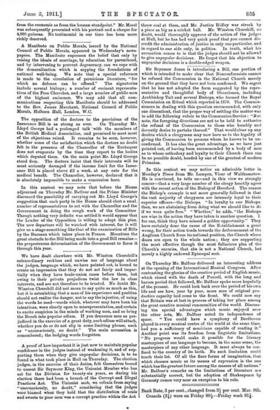On Thursday Mr. Balfour delivered an interesting address at the
opening of the International Musical Congress. After contrasting the glories of the creative period of English music, which closed with the death of Purcell, with the long and barren period that followed, Mr. Balfour spoke more hopefully of the present. He could look back over the period of his own life and see how, year by year, more men of original pro- ductive capacity had come to the front. We could now say that Britain was at last in process of taking her place among the great creative musical communities of the world. Discuss- ing the special advantages which music enjoyed over the other arts, Mr. Balfour noted its independence of space. " You could have a symphony, of Beethoven played in every musical centre of the world at the same time, had you a sufficiency of musicians capable of reading it." Another point was its freedom from linguistic limitations. "No progress would make it possible for the literary masterpiece of one language to become, in the same sense, the masterpiece of any other language. It must always be con- fined to the country of its birth. No such limitation could touch their lot. Of all the finer forms of imagination, that which chooses music as its means of expression is the one which has the greatest future among the masses of all nations." Mr. Balfour's remarks on the limitations of literature DA e substantially correct, but the adoption of Shakespeare by Germany comes very near an exception to his rule.






































 Previous page
Previous page